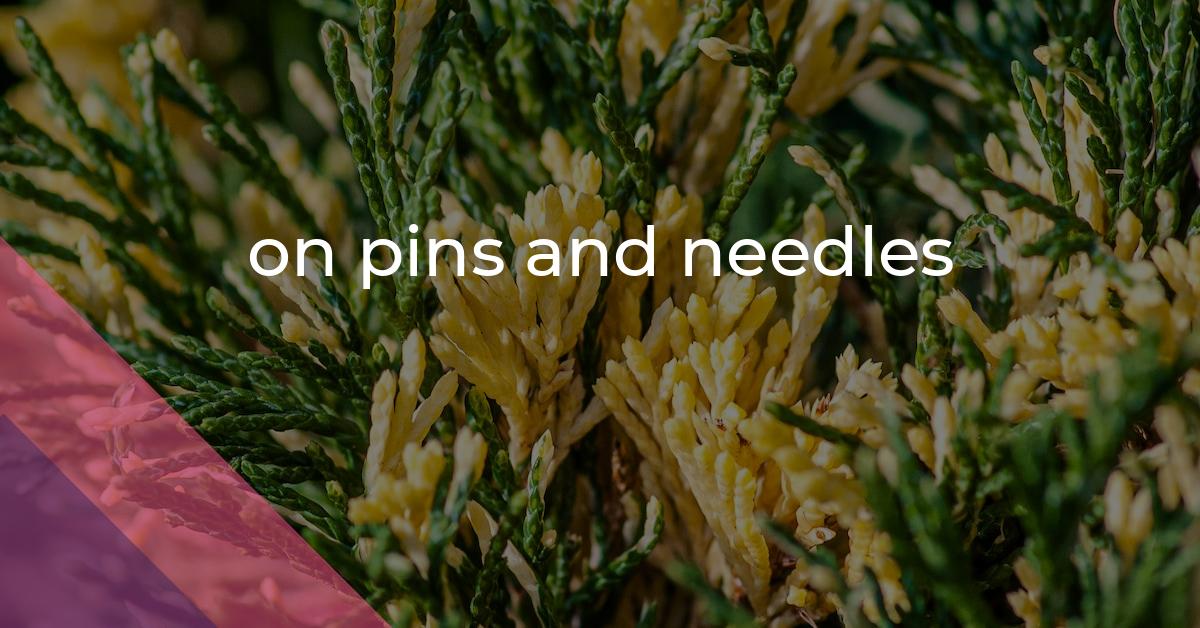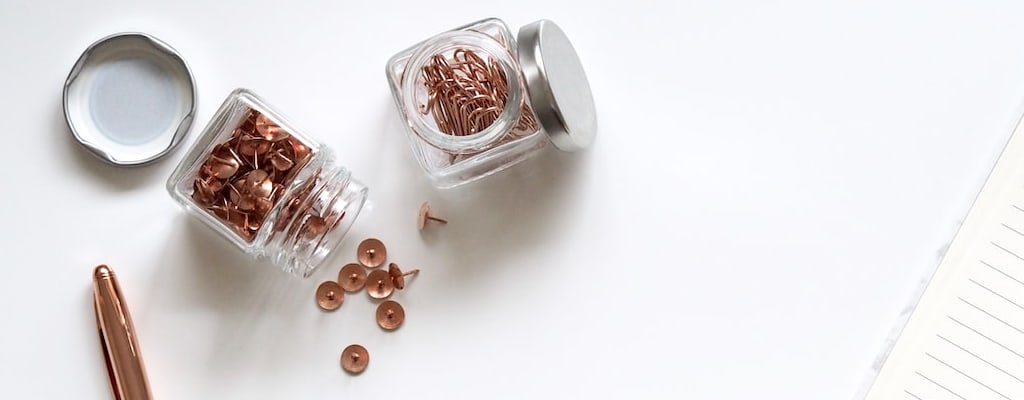on pins and needles: Idiom Meaning and Origin
What does ‘on pins and needles’ mean?
The idiom "on pins and needles" means to feel extremely anxious or nervous, often because of anticipation or uncertainty about something.

Idiom Explorer
The idiom "scared to death" means to be extremely frightened or afraid to the point where it feels like one could die from fear.
The idiom "scared shitless" means to be extremely frightened or terrified to the point of losing control over bodily functions. It is an intensified version of simply feeling scared.
The idiom "run scared" means to feel fearful or panicked, usually because of a perceived threat or danger. It is often used to describe someone who is in a state of heightened anxiety and is acting out of fear.
The idiom "press the panic button" means to react to a situation with extreme fear or urgency, often making irrational or hasty decisions.
The idiom "pressed for time" means to be in a hurry or have a shortage of time to complete a task or attend to something important.
The idiom "out on one's feet" means to be extremely tired or exhausted, to the point of not being able to continue or function properly.
"On thin ice" is an idiom that means being in a risky or dangerous situation, where one's actions may lead to negative consequences or trouble.
The idiom "on the run" means being in a state of constant movement or being pursued by someone or something. It can also refer to living a fast-paced and hectic life without any moment of rest or relaxation.
The idiom "on the ropes" means being in a difficult or vulnerable position, usually in a competition or struggle.
Unsettling anticipation
The idiom "on pins and needles" is a commonly used phrase in the English language. It is often used to describe a state of extreme anxiety or anticipation. The idiom is typically used to convey a heightened sense of anticipation or anxiety, suggesting a feeling of being on edge or in a state of unease.
Despite the lack of a definitive origin, the meaning of "on pins and needles" remains consistent. It describes a state of nervousness or suspense, often in relation to an upcoming event or situation. It can be used in various contexts, such as waiting for important news, awaiting the outcome of a crucial decision, or anticipating the start of an eagerly awaited event.
The idiom "on pins and needles" is a metaphorical expression, as it does not refer to the literal act of being physically positioned on actual pins and needles. Instead, it draws on the discomfort and unease associated with such a situation to convey a psychological state. By evoking the imagery of a person anxiously waiting or anticipating something, the idiom effectively communicates the emotional intensity of the situation.
One interesting aspect of the idiom is its versatility. It can be used in both casual and formal contexts, making it a versatile expression that can be easily incorporated into everyday conversations or more formal written discourse. Its widespread usage and intuitive understanding among English speakers make it a frequently employed idiom.
The idiom "on pins and needles" has become deeply ingrained in the English language, with its usage dating back many years. It has become a commonly understood and recognized expression, conveying a specific emotional state. Its figurative nature makes it a powerful tool for evoking the desired emotional response in both verbal and written communication.
While the exact origins of the idiom may remain elusive, its continued usage and popularity suggest that it resonates with people on a deeper level. The feeling of being on pins and needles, with its associated tension and anticipation, is a universal experience that transcends cultural and linguistic boundaries. As such, the idiom stands as a testament to the enduring power and effectiveness of figurative language in human communication.
The idiom "on tenterhooks" is closely related to "on pins and needles". Both idioms convey a sense of anxious anticipation. While "on pins and needles" suggests a feeling of unease or nervousness, "on tenterhooks" adds an element of suspense or uncertainty to the mix. It can be used to describe a state of heightened tension or emotional strain, often in relation to an impending event or outcome. For example, someone waiting for the results of a job interview might be "on tenterhooks", anxiously awaiting the news.
The idiom "on edge" is another expression that shares similarities with "on pins and needles". Both idioms convey a state of heightened nervousness or unease. While "on pins and needles" focuses more on the sense of anticipation, "on edge" suggests a feeling of being tense or easily irritable. It can be used to describe someone who is highly strung or on the verge of losing their composure. For instance, a person going through a stressful period at work might be described as "on edge", constantly on the lookout for any potential problems or setbacks.
The idiom "on the edge of one's seat" is another expression that closely aligns with "on pins and needles". Both idioms convey a sense of intense excitement or suspense. While "on pins and needles" emphasizes the feeling of apprehension or nervousness, "on the edge of one's seat" adds an element of anticipation and engagement. It can be used to describe someone who is fully engaged or captivated by a thrilling or suspenseful event. For example, a person watching a thrilling movie or a suspenseful sporting event might say they are "on the edge of their seat", unable to look away or relax.
The idiom "bite one's nails" is another expression that shares similarities with "on pins and needles". Both idioms convey a sense of nervousness or anxiety. While "on pins and needles" focuses on the general state of unease, "bite one's nails" provides a specific action that symbolizes anxiety. It can be used to describe someone who is visibly anxious or worried, often to the point of biting their nails. For instance, a person waiting for the results of a medical test might be "biting their nails", unable to relax or calm their nerves.
The idiom "nervous hit" is another expression that relates to the feeling described by "on pins and needles". Both idioms describe a state of heightened nervousness or anxiety. While "on pins and needles" focuses on the general feeling of unease, "nervous hit" refers to the sudden surge of anxiety or nervousness. It can be used to describe someone who is suddenly overcome with worry or apprehension. For example, a person about to give a presentation might experience a "nervous hit" just before stepping on stage, feeling their heart race and their palms become sweaty.
Example usage
Examples of how the idiom *on pins and needles* can be used in a sentence:
- She was on pins and needles waiting for the test results.
- He is on pins and needles because he is about to propose.
- The suspenseful movie had the audience on pins and needles.
More "Anticipation" idioms



